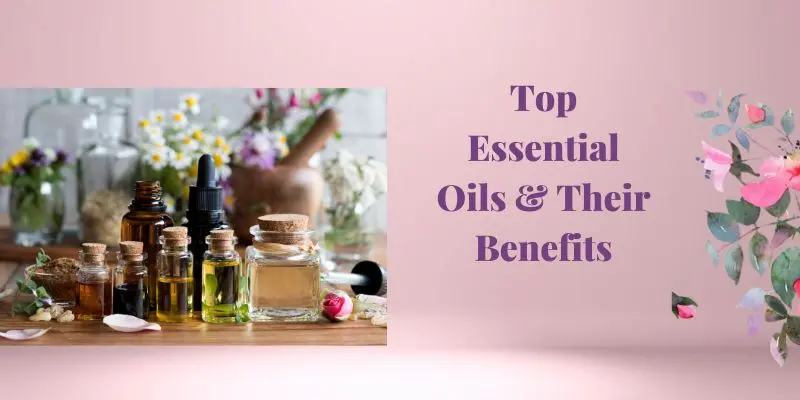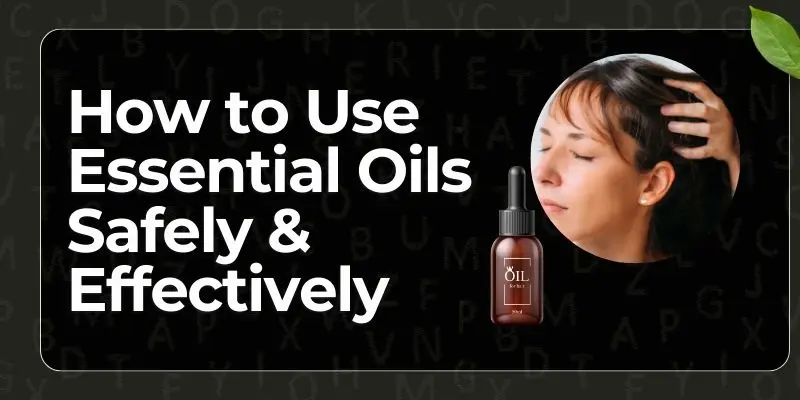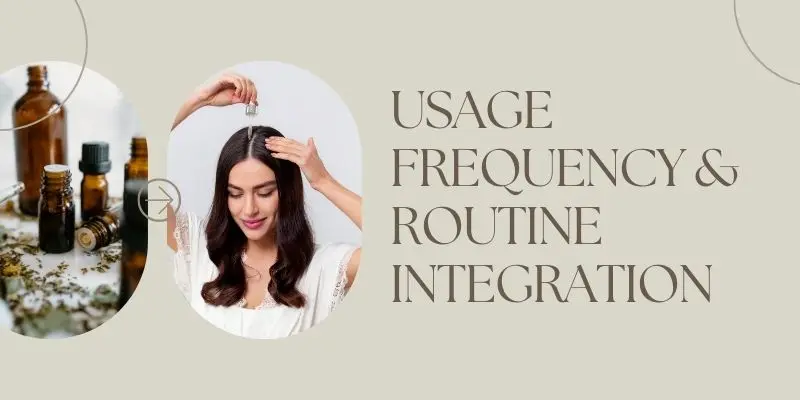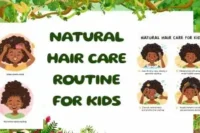Best Essential Oils for Hair Health,Growth & Thickness
Published: 28 Sep 2025
Struggling with thin, weak, or slow-growing hair? You’re not alone. Many people turn to essential oils for hair growth as a safe, natural solution. Backed by research and trusted for centuries, these plant-based oils can improve scalp health, fight dandruff, and boost thickness.
In this guide, you’ll discover the best essential oils for hair health, growth, & Thickness, how to use them safely, and simple recipes you can try at home. Keep reading—your journey to stronger, shinier, and fuller hair starts here.
How Essential Oils Support Hair Growth
Essential oils do more than just smell good. They contain natural compounds that target the root causes of weak or thinning hair, helping to regrow thinning hair and restore strength. Here’s how they work:
1. Boosting Blood Flow to the Scalp
Good blood circulation is key to hair growth. When blood flows smoothly, it brings oxygen and nutrients to your hair roots.
- Rosemary oil is famous for this. Studies show it can work almost like minoxidil (a common hair treatment) by improving thickness and regrowth.
- Peppermint oil gives a cool, tingling effect on the scalp. This sensation means blood flow is increasing, which wakes up hair follicles and supports faster growth.
2. Fighting Scalp Problems
A healthy scalp is the base for strong hair. Dirt, excess oil, or germs can block follicles and stop growth.
- Tea tree oil has antibacterial, antifungal, and anti-inflammatory powers. It helps clear dandruff, reduce itchiness, and keep the scalp clean.
- Lavender oil is gentle but powerful. It calms scalp irritation and may help balance natural oils. Plus, research suggests it can even encourage new hair to grow.
3. Adding Moisture and Repair
Dry, brittle hair breaks easily. Essential oils mixed with carrier oils (like coconut, argan, jojoba, or olive oil) deeply nourish the strands.
- Carrier oils are rich in fatty acids, vitamin E, and antioxidants, which repair damage and lock in moisture.
- This keeps your hair soft, shiny, and less likely to split or break, making it look fuller and healthier over time.
👉 In short: essential oils improve blood flow, fight scalp problems, and repair dryness. Together, these benefits create the perfect environment for stronger, longer, and healthier hair.
Top Essential Oils & Their Benefits
Essential oils are natural, plant-based concentrates that can transform your hair when used the right way.

Let’s look at the best options and how they help.
A. Essential Oils (Powerful Concentrates)
🌿 Rosemary oil
- Improves blood circulation in the scalp.
- Studies suggest it may work almost like minoxidil but with fewer side effects.
- Great for boosting thickness and regrowth.
🌿 Peppermint oil
- Creates a cooling, tingling feeling that increases blood flow.
- In one animal study, hair growth increased by 92% with peppermint oil compared to 55% with standard treatments.
- Helps awaken “sleeping” hair follicles.
🌿 Lavender oil
- Known for its soothing scent.
- Animal research shows it may encourage faster hair regrowth.
- Also fights scalp inflammation and dryness.
🌿 Tea tree oil
- Packed with antifungal and antibacterial properties.
- Cleanses blocked follicles and reduces dandruff.
- Supports a healthy scalp environment for new growth.
🌿 Clary sage, sandalwood, and geranium oils
- Add natural shine and softness.
- Help balance scalp oils, preventing too much dryness or greasiness.
- Often used in plant-based hair treatments for overall scalp health.
B. Carrier Oils (Nourishing Bases)
Essential oils are strong, so they must be diluted before use. This is where carrier oils come in. They not only make essential oils safe but also nourish your hair on their own.
🥥 Coconut oil
- Penetrates deep into the hair shaft.
- Reduces protein loss, keeping strands strong.
- Perfect for dry or damaged hair.
🌰 Argan oil
- Rich in vitamin E and antioxidants.
- Improves elasticity and fights frizz.
- Leaves hair soft, smooth, and shiny.
🌿 Jojoba oil
- Very similar to the scalp’s natural oil (sebum).
- Helps reduce breakage and split ends.
- Ideal for balancing moisture without greasiness.
🍈 Olive oil
- Loaded with antioxidants and fatty acids.
- Deeply moisturizes and adds natural shine.
- Protects against dryness and UV damage.
🥑 Avocado, almond, grapeseed, and baobab oils
- Avocado oil: nourishes with vitamins A, D, and E.
- Almond oil: makes detangling easier and smooths frizz.
- Grapeseed oil: lightweight hydration, suitable for oily scalps.
- Baobab oil: protects hair from the sun and environmental stress.
👉 Together, essential oils act as powerful treatments, while carrier oils provide deep nourishment and make them safe to apply. Mixing the two is the secret to healthy, thicker, and stronger hair.
How to Use Essential Oils Safely & Effectively
Essential oils are powerful. If used the wrong way, they can cause irritation instead of benefits.

That’s why it’s important to follow safe steps before adding them to your hair care routine.
1. Dilution Guidance
Essential oils must always be mixed with a carrier oil before applying to the scalp.
- Safe ratio: 1–2% essential oil in carrier oil.
- This means about 5–10 drops of essential oil per 10 mL (2 teaspoons) of carrier oil.
- Popular carrier oils: coconut, jojoba, argan, or olive oil.
2. Do a Patch Test
Before applying all over the scalp, test the oil blend on a small area of skin (like inside your arm).
- Wait 24 hours.
- If there’s redness, itching, or burning, don’t use it.
- This step helps avoid allergic reactions or contact dermatitis.
3. Application Methods
✨ Scalp Massage
- Warm the oil blend slightly.
- Massage gently into your scalp for 5–10 minutes.
- This increases blood flow and stimulates follicles.
✨ Pre-Shampoo Mask
- Apply the oil mixture to your scalp and hair.
- Leave it on for 20–30 minutes.
- Wash with a mild shampoo.
✨ Leave-In or Overnight Treatment
- Apply a light amount to the scalp before bed.
- Use a towel or cap to protect your pillow.
- Wash out in the morning.
✨ Mix with Conditioner or Hair Mask
- Add a few drops of diluted essential oil to your regular conditioner or deep mask.
- This boosts shine, softness, and scalp health.
4. Safety Precautions
- Never use essential oils undiluted on your scalp—they can cause burns or rashes.
- Some oils, like peppermint and tea tree, may cause tingling or mild irritation in sensitive people.
- Avoid use near the eyes, nose, or mouth.
- Pregnant women, children, or people with medical conditions should consult a doctor before use.
👉 Safe use means dilution, patch testing, and proper application methods. When used correctly, essential oils can be one of the best natural remedies for hair growth.
Sample Recipes You Can Try
You don’t need expensive products to enjoy the benefits of essential oils. With just a few drops, you can make powerful blends at home.

Always remember to dilute essential oils in a carrier oil before use. Here are some easy recipes:
🌱 Growth Boost Blend
What you need:
- 10 mL jojoba oil (carrier oil)
- 5 drops rosemary essential oil
- 3 drops peppermint essential oil
How to use:
Mix well and massage into your scalp for 5 minutes. Leave it on for 20–30 minutes before shampooing. This blend improves blood flow, stimulates follicles, and helps with hair regrowth.
🌸 Soothing Scalp Blend
What you need:
- 10 mL coconut oil (carrier oil)
- 4 drops lavender essential oil
- 3 drops of tea tree essential oil
How to use:
Apply gently to your scalp and leave for 30 minutes. Rinse with a mild shampoo. This blend fights dandruff, reduces itchiness, and calms irritation while keeping your scalp fresh.
✨ Moisture & Shine Blend
What you need:
- 10 mL argan oil (carrier oil)
- 5 drops sandalwood essential oil
- 4 drops geranium essential oil
How to use:
Work the mixture through your hair from roots to tips. Leave on for 20–40 minutes before washing. This recipe restores moisture, tames frizz, and gives hair a natural shine.
👉 Tip: You can store these blends in small dark glass bottles to keep them fresh. Use them 2–3 times a week for the best results.
Usage Frequency & Routine Integration
Knowing how often to use essential oils is just as important as knowing which oils to pick.

Overuse can lead to scalp irritation, while too little may not show results. Here’s a simple guide:
🌀 Weekly Scalp Treatment
Once a week, massage a blend of essential oils and carrier oils into your scalp. This helps improve blood flow, clear buildup, and support stronger roots.
🌿 Twice-Weekly Deep Mask Boost
If your hair is dry, damaged, or prone to breakage, apply an oil blend as a deep mask two times a week. Leave it on for 30–40 minutes before shampooing. This routine keeps hair nourished and shiny.
🌞 Daily Light Leave-In (Optional)
For very dry or frizzy hair, you can apply 1–2 drops of diluted oil daily to the ends. Oils like argan or jojoba are perfect for this because they are lightweight and non-greasy.
⏰ Best Time to Apply
- Pre-wash: Ideal for scalp massages and masks. Protects hair from shampoo dryness.
- Post-wash: A few drops on damp hair tame frizz and add shine.
- Overnight: For deep repair, leave a light oil blend overnight and wash in the morning.
👉 Consistency is key. Results from natural remedies for hair growth usually take a few weeks to show. Stick with your routine for at least 8–12 weeks to notice visible changes.
Who Will Benefit Most
Not every oil is right for every type of hair. The best results come when you match the oil to your concern. Here’s a simple guide:
🌱 Thinning or Slow Growth
If your hair is thinning or grows slowly, choose rosemary essential oil or peppermint essential oil. These oils stimulate blood flow, wake up hair follicles, and may even work as a natural support alongside treatments like rosemary vs minoxidil for hair.
💧 Dry or Damaged Hair
For hair that feels rough, brittle, or over-processed, go for rich carrier oils like coconut oil, argan oil, or avocado oil. These are packed with fatty acids and vitamins that repair damage, lock in moisture, and reduce breakage.
❄️ Scalp Issues (Dandruff & Itchiness)
If you deal with dandruff, flakes, or an itchy scalp, tea tree essential oil and lavender essential oil are the top picks. They fight fungi and bacteria, calm inflammation, and bring balance to your scalp. These are some of the best oils for dandruff and scalp health.
🌸 Fine Hair
For fine or thin strands, heavy oils can weigh hair down. Instead, try grapeseed oil or jojoba oil. These oils are lightweight, add hydration, and protect against breakage without making hair greasy.
👉 The right oil can make a big difference. Think about your hair concern first, then choose an essential oil or carrier oil that directly targets that need.
Quick Reference Table
This table gives you a fast way to choose the right oil for your needs:
| Oil Type | Best For | Notes |
| Rosemary oil | Stimulating growth | Always dilute before use with a carrier oil |
| Peppermint oil | Hair follicle vitality | Has a strong menthol tingling sensation |
| Lavender oil | Scalp soothing | Works well in evening routines for relaxation |
| Tea tree oil | Dandruff control | Do a patch test to check for sensitivity |
| Coconut oil | Moisture and repair | Warm slightly before applying for better spread |
| Argan oil | Frizz control & shine | Safe for everyday light use |
👉 This quick guide makes it easy to remember which essential oils for hair health and growth suit your needs best.
Conclusion
The best essential oils for hair health, growth, & thickness are a safe, natural way to fight hair thinning, improve scalp health, and boost shine. From rosemary vs. minoxidil for hair to the benefits of lavender oil for scalp, these plant-based remedies offer real results without harsh chemicals. Pairing carrier oils like coconut, argan, or jojoba makes essential oil blends more effective and gentle on your skin.
Consistency is key—regular scalp massage with oils or using them in masks can support natural remedies for hair growth, fight dandruff, and protect against damage.
👉 Ready to try it yourself? Explore our essential oil hair growth kit, packed with the best essential oils for hair thickness, scalp care, and overall shine. Your healthy, fuller hair starts today! 🌿✨
FAQs on Essential Oils for Hair Growth
The best essential oil for hair growth and thickness is often rosemary essential oil. Studies suggest it can work as effectively as minoxidil but with fewer side effects. It improves blood circulation in the scalp, strengthens hair follicles, and promotes new growth. When mixed with a carrier oil like coconut or jojoba, it delivers even better results.
For natural hair growth and thickness, a combination of essential oils and carrier oils works best. Peppermint oil stimulates hair follicles, rosemary oil supports thickness, and lavender oil calms the scalp. Pair them with argan oil or coconut oil for deep nourishment and hydration, giving you stronger and fuller hair over time.
If you have thin or fine hair, grapeseed oil and jojoba oil are excellent lightweight options. They don’t weigh hair down and still provide hydration. For stimulation, peppermint essential oil can boost follicle activity and encourage new growth. These oils also protect thin hair from breakage and dryness, making strands appear fuller.
Peppermint essential oil is known for speeding up hair growth due to its menthol content, which increases blood flow to hair follicles. Combined with rosemary oil, it helps hair grow faster and thicker. Always dilute with a carrier oil like coconut or olive oil before applying to the scalp for safe and effective results.
Yes, certain essential oils may help reduce hair loss naturally. Oils like cedarwood, rosemary, and lavender can strengthen roots, balance scalp oils, and improve follicle health. While results vary from person to person, regular scalp massage with diluted oils often helps slow down shedding and encourages healthier regrowth.
Always dilute essential oils with a carrier oil like coconut, jojoba, or argan before applying to your scalp. A safe ratio is about 5–10 drops of essential oil per 10 mL of carrier oil. Do a patch test to check for allergies. Apply through scalp massage, hair masks, or by mixing with shampoo for safe use.
Hair growth takes time, so results are not instant. With regular use of oils like rosemary, peppermint, or tea tree, many people notice stronger, shinier, and healthier hair within 8–12 weeks. Consistency and proper application are key—skipping treatments may delay visible improvements.
Most essential oils are safe for teenagers and adults when diluted. However, they may irritate sensitive skin if used incorrectly. Avoid applying oils directly to children’s faces, especially peppermint oil. Always follow the right dilution ratio for essential oils and consult a doctor if you have allergies or scalp conditions.
You can add essential oils to your routine in many ways. Try a weekly scalp massage, a pre-shampoo oil mask, or a few drops mixed into your conditioner. For frizz control, apply 1–2 drops of argan or jojoba oil to damp hair. Choose methods that suit your hair type and stick with them for the best results.
Yes, many essential oils are excellent for dandruff and scalp issues. Tea tree oil has antifungal properties that help fight flakes, while lavender oil soothes irritated skin. Lemongrass oil is another excellent choice for naturally reducing dandruff. Regular scalp massage with these diluted oils can bring long-term relief.

- Be Respectful
- Stay Relevant
- Stay Positive
- True Feedback
- Encourage Discussion
- Avoid Spamming
- No Fake News
- Don't Copy-Paste
- No Personal Attacks

- Be Respectful
- Stay Relevant
- Stay Positive
- True Feedback
- Encourage Discussion
- Avoid Spamming
- No Fake News
- Don't Copy-Paste
- No Personal Attacks





